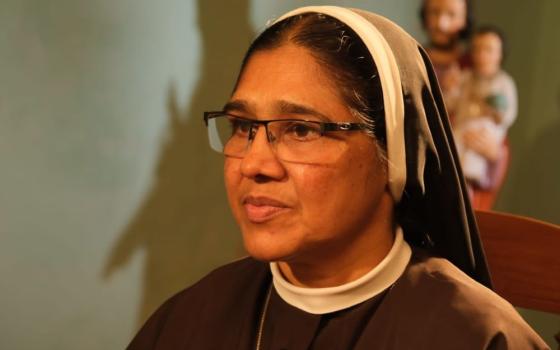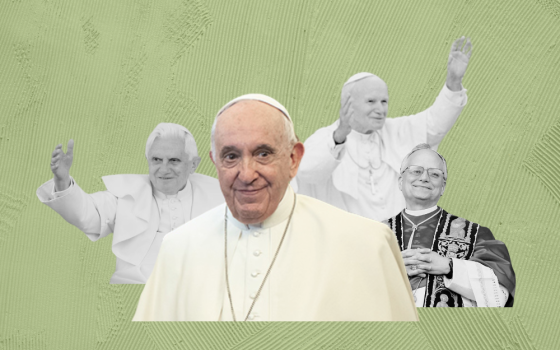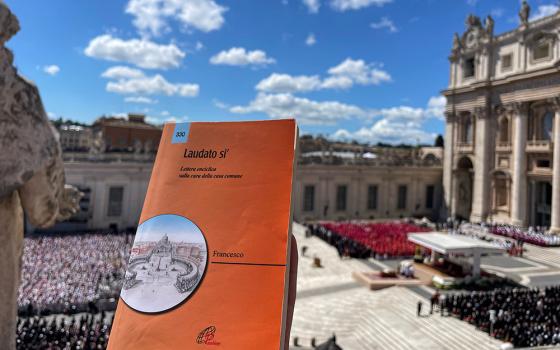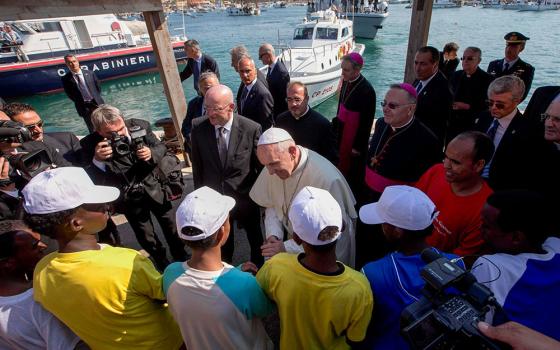Pope Francis greets the crowd before celebrating Mass at Ndolo airport Feb. 1, 2023, in Kinshasa, Congo. (CNS/Paul Haring)
Across Africa, the death of Pope Francis is still being keenly felt as Catholic sisters and others mourn the pontiff who paid particular attention to the continent, visiting 10 countries there during his papacy. His death has left a deep void, especially among those who saw him as an advocate for the poor and marginalized, and on issues such as climate change, mineral extraction, economic equity and human trafficking.
From bustling cities to remote villages across Africa, many reflected on Francis' efforts to bridge global divides and promote justice and peace. Francis was laid to rest on April 26 at the Santa Maria Maggiore Basilica after his funeral in Vatican City. His death sparked an outpouring of tributes from religious sisters and communities inspired by his humble leadership and inclusive vision for the Catholic Church.
"Pope Francis adhered to Christian and Gospel values of fraternal love, humility, and forgiveness," said Sr. Bridgita Samba Mwawasi, a member of the Sisters of St. Joseph of the Catholic Archdiocese of Mombasa in Kenya. She noted that Francis encouraged both pastors and laity to seek and embody examples of Christian holiness. "He understood the divisions not only in society but even in the church and thus strived to build bridges of connection rather than walls of separation."
Sr. Euphresia Nzisa Kisilu of the Sisters of St. Joseph of Tarbes said she and the other sisters are heartbroken by the Holy Father's death. They had been praying for his recovery from severe pneumonia.
"I know him as a man of great humanity, simplicity, liberty and freedom," added Kisilu, who serves in the Democratic Republic of Congo. "He hated injustice and loved peace, which is why he was so close to the poor and marginalized. He couldn't keep quiet in case of war, calamities or even accidents. In general, he was a man for all people."
Advertisement
Numerous trips to Africa
Francis demonstrated his commitment to the continent by making five impactful trips to Africa during his papacy. He prioritized visiting countries in conflict and humanitarian crises, such as the Central African Republic, South Sudan, the Democratic Republic of the Congo and Mozambique. He also reached out to nations facing economic hardship and climate change, including Madagascar and Mauritius, highlighting his commitment to human dignity and environmental stewardship.
The pontiff showed boldness in his mission to foster peace, often choosing to celebrate Mass in marginalized communities and offering powerful gestures of unity — such as humbly kissing the feet of political adversaries. His commitment to reconciliation was especially visible in South Sudan, a nation devastated by years of civil war, where the conflict has led to the loss of hundreds of thousands of lives and forced millions to flee their homes.
"On behalf of the people of South Sudan, I thanked him for his humble gesture to the political leaders of South Sudan (President Salva Kiir and his deputy, Vice President Riek Machar) by kissing their feet in a bid to end hostilities in the country," grieved Sr. Alice Jurugo Drajea, former superior general of the Sisters of the Sacred Heart of Jesus in Juba, South Sudan.
Drajea, who is currently in Manila, the capital of the Philippines, on sabbatical leave, mentioned that she interacted with the Holy Father during his visit to South Sudan in 2023. She emphasized that his trip aimed to show solidarity with the people and advocate for peace.
She expressed her hope that Francis' efforts to bring peace to South Sudan will be realized.
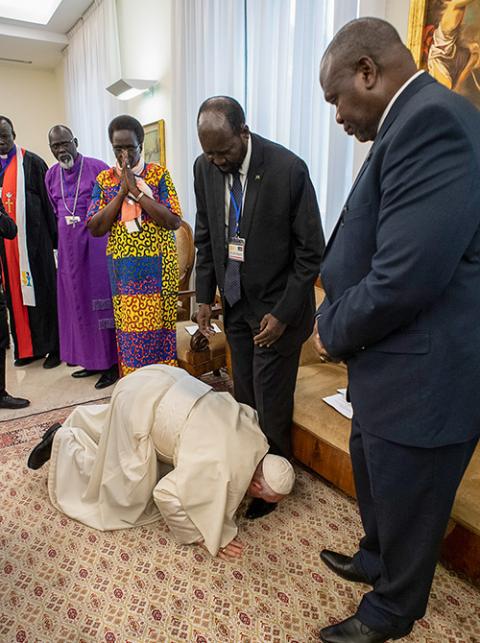
Pope Francis kisses the feet of South Sudan President Salva Kiir April 11, 2019, at the conclusion of a two-day retreat at the Vatican for African nation's political leaders. The pope begged the leaders to give peace a chance. At right is Vice President Riek Machar. (CNS/Vatican Media via Reuters)
"If these leaders don't reach an agreement on peace, then the pope's efforts and death would have meant nothing," she said, urging Kiir and Machar to make peace in honor of Francis' death. "It would be a big shame and disappointment to peace lovers and the church."
Sr. Jane Wakahiu also said that the image of Francis she holds dear is of him kneeling to kiss the feet of South Sudanese leaders. In that moment, she said, he urged them to pursue a lasting solution to end the conflict in their country and to allow their people to experience healing.
"For me, this action was a movement of the spirit that reminded me of Jesus emptying himself for the love of humanity," said Wakahiu, a member of the Institute of the Little Sisters of St. Francis in Kenya, as well as the associate vice president of program operations and head of the Catholic Sisters Initiative at the Conrad N. Hilton Foundation. (Global Sisters Report is largely funded through a Conrad N. Hilton Foundation grant.) "The action was an anchor of hope and a well of charity in a world where power and the powerful have their way."
Sr. Orla Treacy, an Irish Loreto nun who operates a boarding school in war-torn South Sudan, works with youth to promote women's education and prevent child marriages. Treacy said Francis' death has shocked and saddened the nation of nearly 12 million people, particularly young people.
Youths had interacted with him during his visit to the country, where he urged them to be ambassadors of peace. "But they are grateful for his visit to South Sudan, which has changed their lives," Treacy said. "The youth remain more committed to working for peace and building peaceful communities in South Sudan."
Congo, which has endured various civil wars for the past three decades, including the current conflict between Congolese soldiers and M23, was inspired by Francis' visit, Kisilu said. He had urged the nation to embrace peace and put an end to the war.
"Pope Francis left a legacy in Congo. He came when he was most needed, and his presence calmed people. Joy spread throughout Congo. He reconciled the Congolese," she said. "He also met the religious; we were so many. He really encouraged us, and he told us that we should not get discouraged in spite of the many challenges we are facing."
Nuns react as Pope Francis arrives for a meeting with bishops, priests, religious and seminarians in St. Theresa Cathedral in Juba, South Sudan, Feb. 4, 2023. (CNS/Paul Haring)
Pope of the poor
Africa has the highest levels of extreme poverty in the world, with 23 out of the 28 nations on the continent with poverty rates exceeding 30%. According to recent data from Outreach International, approximately 35.5% of Africa's population lives on less than $1.90 a day, the global benchmark for extreme poverty. This figure is notably higher — about 6.8 times greater — than the average extreme poverty rate in the rest of the world.
Religious sisters said that Francis consistently demonstrated a profound concern for the poor in Africa, reflecting his broader commitment to the marginalized worldwide. His visits to the continent and the messages he shared, they said, emphasized his focus on social justice, peace, and the well-being of the poor in Africa.
In 2015, for example, Francis made his first trip to Africa, visiting Kenya, Uganda and the Central African Republic. During this visit, he made impactful statements about the plight of Africa's poor, emphasizing the need for solidarity and justice. He toured the Kibera slum in Nairobi, one of the largest slums in Africa, and expressed deep concern about poverty, inequality and the social injustices faced by its residents. He underscored the importance of recognizing the dignity of every individual, especially those who are most vulnerable.
The sisters also noted that Francis frequently spoke out against the corruption and political instability that often worsen poverty and inequality in Africa. They highlighted that he criticized both African governments and multinational corporations for their roles in economic exploitation and the lack of opportunities available to the continent's poor.
"Having lived through the papacies of both Pope John Paul II and Pope Francis, one could clearly see Pope Francis' down-to-earth nature and his desire to connect with the human experience," said Sr. Eneless Chimbali, a member of the Servants of the Blessed Virgin Mary of Blantyre, Malawi, and senior program officer for the All-Africa Conference: Sister to Sister.
"His empathy for those suffering from civil war was profound. He also showed profound compassion for prisoners and, in an unexpected gesture of humility, included prisoners and immigrants in the washing of the feet. He truly lived a life modeled after Christ."
Chimbali added that Francis possessed a remarkable ability to empathize with others, a quality essential for achieving Christ's peace. "I am deeply grateful for the opportunity to witness the life and leadership of Pope Francis."



